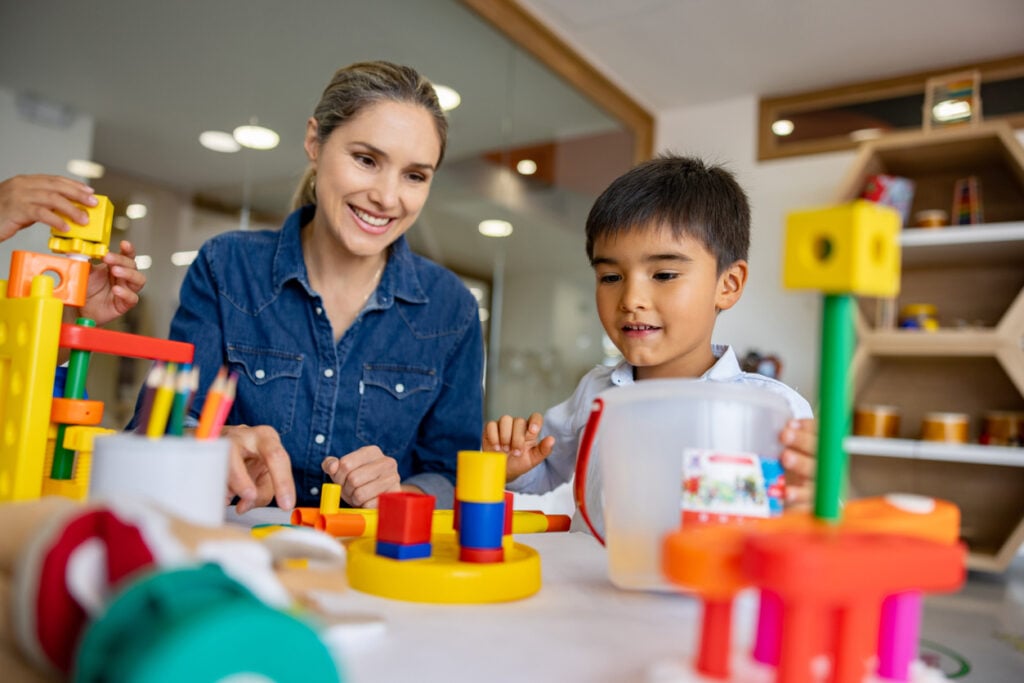Year Five Developmental Milestones


As your child approaches age five, they are preparing to embrace the world with newfound confidence. Now, it’s about refining their skills, deepening their understanding, and expanding their independence. They are eager to tackle fresh challenges and explore their creativity.
By this stage, your child’s curiosity is boundless. They ask more thoughtful questions, engage in complex conversations, and begin to grasp abstract concepts like time, cause and effect, and responsibility. Their ability to follow rules, manage emotions, and cooperate with others is growing. TLC Therapy Services can help them with these key skills so they transition smoothly into kindergarten.
At 4-5 Years Old: Building on a Solid Foundation
Your child is evolving into an independent and self-assured individual, eager to showcase their expanding abilities. They’ll engage in more advanced conversations, develop closer friendships, and build on the skills they’ve been working on over the past few years. The major developmental milestones for this age, like those of the year before, may be more spread out over the year.
- Language: By age five, children can tell simple stories with a clear beginning, middle, and end. They can answer questions about a story read to them, understand and use words related to time (yesterday, today, tomorrow), and maintain longer conversations. Their ability to recognize rhyming words strengthens. They can express their needs clearly and may also experiment with jokes and wordplay, showing a growing sense of humor.
- Cognitive: Five-year-olds have a stronger grasp of numbers, counting up to 10 or more. Many can recognize and write some letters and numbers, especially those in their name. They understand positional words like “above” and “below” and can sort objects by more than one category, such as size and color. They also show greater focus, maintaining attention on structured activities (other than TV or computer games) like puzzles or drawing for 5-10 minutes. They also start using reasoning skills, explaining their decisions, and making plans—like deciding what to bring on a trip or how to build a tower with blocks.
- Social: At this age, children begin to develop a deeper understanding of rules and fairness. They take turns, follow simple game rules, and express empathy by recognizing when a friend is upset. Many enjoy performing—singing, dancing, or acting in front of family and peers—showing increased confidence in social situations. They also want to help out at home and can complete simple chores, such as feeding a pet, setting the table, or tidying their toys. They show off new skills by saying things like, “Watch me!” seeking your attention and validation.
- Movement: Five-year-olds demonstrate greater coordination and balance. They can hop on one foot for several seconds, climb stairs while alternating feet without using a railing, and catch a ball with more accuracy. They can button and unbutton clothing, use child-safe scissors, and draw recognizable shapes and letters with more control.
Activities to Support Your Child’s Development at Home
As your child nears their fifth birthday, they are eager to take on more complex challenges and assert their independence. You can support their development through engaging activities that encourage learning, creativity, and social interaction while strengthening their confidence.
1
Encourage storytelling by having your child describe their day, make up stories, or retell favorite books in their own words. Ask open-ended questions like, “What do you think happens next?” to develop their reasoning and comprehension skills.
2
To strengthen cognitive skills, play games that require problem-solving, like simple riddles, sorting activities, or scavenger hunts where they follow clues. Introduce early math concepts by having them count objects in their environment, compare sizes, or measure ingredients during cooking. Letting them make small decisions, such as picking their outfit for the day, also builds confidence and problem-solving abilities.
3
To support social and emotional development, engage in role-playing games, such as pretending to run a restaurant. Practice taking turns, following instructions, and expressing emotions appropriately. Reading books about emotions and discussing how characters feel helps them recognize and talk about their own feelings. Praising their efforts in teamwork, sharing, and patience fosters positive behavior.
4
Encourage games that involve movement and balancing. Take walks and explore new playgrounds. Activities like jumping rope, dancing, and playing tag help build strength, while fine motor activities like lacing beads, cutting with child-safe scissors, and drawing detailed pictures improve their dexterity for writing.
5
Creativity and expression is another important part of their growth. Provide a variety of art supplies and plenty of free time for drawing, painting, and crafting to allow your kids to explore different forms of self-expression. Music can also play a role—let them experiment with simple instruments, sing songs, or make up dances. Building with blocks, playing dress-up, and acting out stories help refine their problem-solving and narrative skills.
6
Daily life skills are still important now. Assigning simple household tasks like sorting laundry, making their bed, or helping pack snacks teaches responsibility and independence. Encouraging them to clean up after themselves and follow daily routines, without reminders, builds a sense of self-sufficiency.
7
At mealtimes, let them spread peanut butter on toast, pour their own drink, or peel a banana. Exposing them to a variety of healthy foods and involving them in meal preparation will help develop a positive attitude toward nutrition and healthy eating habits.
Looking Ahead: The Transition to Kindergarten

This stage marks an exciting transition as your child moves from preschool into kindergarten, stepping into a new world. Over the past five years, they have grown from a tiny, dependent baby into a confident, curious, and capable individual.
As they prepare for this next chapter, remember that every child progresses at their own pace. Some will quickly grasp letters and numbers and confidently make new friends, while others may need extra assistance or reassurance. The most important thing you can do is nurture their love for learning, encourage their independence, and celebrate their progress.
Enjoy this moment. No matter where they are exactly at this stage, they have come far.

Not sure if your child is meeting expected milestones?
Have questions? TLC Therapy Services is here to help! Call us for an appointment at (770) 696-6649, or fill out the contact form below—we’re happy to guide you toward the right support.
